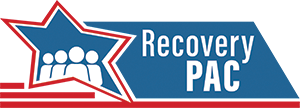About Us
Recovery PAC in Action
Recovery PAC was established to support legislators who understand and champion self-directed, community-supported recovery. We use direct political action to focus attention on the value of addiction & mental health recovery in our communities.
The 82nd Regular Session of the Nevada Legislature begins on February 6, 2023. We look forward to working with our legislators and standing up for recovery in Carson City and throughout the Silver State.
Recovery PAC Victories!
Passed Bills
Senate Bill 69
Senate Bill 69, sponsored by the Washoe Regional Behavioral Health Policy Board, passed both houses and was signed by the Governor. This new law will require certification of a person who receives compensation to provide or supervise the provision of peer recovery support services. This bill will also address evidence-based curricula and programs concerning the prevention of substance misuse and substance use disorder by the Department of Education.
Senate Vote: 21-0-0
Assembly Vote: 38-4-0
Effective Date: For the certification, this bill becomes effective upon passage for the purposes of adopting the regulations necessary to implement the provisions of the bill and then on January 1, 2022. For the educational component, this bill becomes effective on July 1, 2021.
Senate Bill 390
Senate Bill 390, sponsored by Senator Julia Ratti, will establish a statewide suicide prevention and mental health crisis hotline utilizing the 9-8-8 National Suicide Prevention Lifeline program. It will also require the Division of Public and Behavioral Health to establish mobile crisis teams to respond to calls by coordinating and deploying necessary services. And this bill will create the Fund for a Resilient Nevada to hold the proceeds of opioid litigation and creates the Advisory Committee for a Resilient Nevada to administer, allocate, and distribute the funds to remediate the harms, impacts, and risks caused by the opioid epidemic to the State of Nevada and to its residents.
Senate Vote: 19-2-0
Assembly Vote: 35-7-0
Effective Date: Upon passage
Assembly Bill 374
Assembly Bill 374, sponsored by Assemblywoman Jill Tolles, will create the Statewide Substance Use Response Working Group within the Office of the Attorney General. This bill will require the working group to comprehensively review all aspects of substance misuse and substance use disorder including prevention, intervention, programs, treatment, and recovery. Most importantly, this group will meet all year to consider these issues, not just during a legislative session. And they will submit annual reports of their recommendations to the Governor, the Attorney General, the Legislature, and other entities.
Assembly Vote: 42-0-0
Senate Vote: 21-0-0
Effective Date: Upon passage
Assembly Bill 158
Assembly Bill 158, sponsored by Assemblywoman Daniele Monroe-Moreno, will revise the penalties for persons under 21 in possession of alcohol, marijuana, or cannabis. Instead of imposing a punishment of imprisonment and fines, this bill will now require for a first violation that an offender perform community service and attend a victim impact panel of persons injured or killed by a person who was driving under the influence. For a second offense, an offender must complete counseling or participate in an educational program, a support group, or another program of treatment for the use of alcohol or other substances. If the offender completes the terms and conditions imposed by the court, the court is required to automatically seal the record.
Assembly Vote: 42-0-0
Senate Vote: 20-0-1
Effective Date: October 1, 2021
Recovery advocacy does not end at sine die. It is vital to maintain momentum and increase visibility with policymakers during the interim. There are several Interim Committees, Commissions, Boards, and Studies that are likely to discuss behavioral health or substance misuse prevention, as well as treatment topics or justice reform, or other issues that may impact the recovery community before the 2023 Legislative Session. And as AB374 demonstrates, lived experience has a seat at the table.
